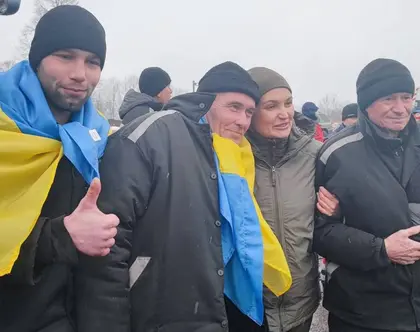There are currently thousands of Ukrainians in Russian captivity – military and civilian, adults and children. Many have been taken forcefully out of Ukraine.
Negotiations continue daily to return Ukrainians to their homes. According to Ukraine’s Commissioner for Human Rights, Dmytro Lubinets, since Russia launched its full-scale invasion in February 2022, more than 2,000 people have already been returned from Russian captivity. The last exchanges took place on April 10 and 16.
JOIN US ON TELEGRAM
Follow our coverage of the war on the @Kyivpost_official.
One such returnee is 64-year-old Anatoly Voloshyn, a pastor-supervisor from Mariupol, Donetsk region. He was considered by his family to have died but was returned to Ukraine on March 7. Kyiv Post talked to him about his experiences.
“Everything went quiet.”
“I remember Feb. 22,” says Anatoly. “I’d been watching the news and thought that something terrible was about to happen. On the outskirts of the city, we could always hear shells exploding somewhere far away, but there was always a dividing line. On Feb. 24, somehow everything went very quiet. We realized that something was wrong,” he adds.
The next day, Anatoly went for a walk to check the situation. Upon passing by the Military Commissariat, he decided to go in and ask if they needed help.
“I handed over my documents and I was registered into the Territorial Defense. We received weapons and went to our place of deployment,” Anatoly recalls.
“The most terrible thing I have ever seen is the Azovstal tragedy”
"I don't remember exactly when we were sent to Azovstal – either on Feb. 26 or 27. I’d worked on a bulldozer for 24 years of my life and they told me that I would be very useful on the excavator.
“I dug trenches and covered buildings with soil. Of course, there was fear among people all around. We were shelled both from the sea and from the air.”
In March, Anatoly was seconded to the “Azov” regiment. A few days later, on March 14, he was injured when shrapnel tore the muscles in his arm and lodged in his chest, breaking his ribs. He was urgently operated on in the nearest hospital, but when the Russians shelled that too, he was advised to return to Azovstal.
Captivity
When working in the area of the plant, Anatoly recalls the military receiving an order to surrender. It was May 17.
“It felt very bad in my heart... We had fought for so long, and now what? I was walking and thinking ‘never in my life would I have believed that, in my old age, I would end up in prison.’ But I understood that the most important thing was to live.”
Anatoly recounts that, until the middle of June, captured Ukrainians were kept prisoner in Olenivka, then transported to Dovzhansk (formerly Sverdlovsk) in the Luhansk region. When the colony in Olenivka was shelled on July 29, Anatoly's four sons believed their father had perished.
At the time, Anatoly was engaged in Christian psychology, helping prisoners who had lost their fighting spirit. They prayed twice a day for Ukraine and for peace.
Homecoming
Upon being released, the first thing Anatoliy did was call his son, Yevgeny, who could not hold back his tears. He cried and asked his father for forgiveness for the fact that he and his siblings had “buried” their father.
"I still can't believe what happened... I'm now undergoing examination and treatment and will have an operation soon. The doctors will glue the nerves in my arm and add some skin.
Anatoly’s goal for the future is to do anything that means he doesn’t have to sit still.
“Victory is still far away,” he insists. “Today, everyone should make an effort to bring this day closer. And it will definitely come.”
You can also highlight the text and press Ctrl + Enter




